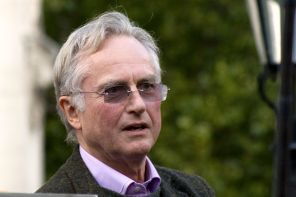“Is evil over?” asked Ron Rosenbaum at Slate last week. “Yes, according to many neuroscientists, who are emerging as the new high priests of the secrets of the psyche, explainers of human behavior in general.” Rightly, Rosenbaum questions the scientism of those who would declare that, since evil — whatever it may be — cannot be pinned down in any specific location or function of the brain, it must not be real.
The article points to a number of ways neuropsychology has been overinterpreted and oversold. Rosenbaum addresses the fetishizing of fMRI images, the ideology that conflates causation and correlation, and the shifting semantics — evil recast as “non-empathy” by one esteemed psychologist (echoing, interestingly, the traditional Christian understanding of evil as a privation).
But it’s the image of scientists as priests that caught my attention. It’s an image that has a lot going for it.
Before I say what exactly it has going for it, however, let me say what it doesn’t have going for it. Science and theology are different. Richard Dawkins is right to say, as he does over and over, that anyone who cares to devote time and effort to understanding evolution can do it. As difficult as it can be, science is, in a very real sense, right there on the page. In fact, in the end there is nothing for it but to be out in the open, to be seen, to be comprehended. This is one of the great joys of science.
Though it has its own joys, theology does not operate this way. Religion does not make sense as a set of strictly empirical claims. It is most definitely not right there on the page. It is not abstract and self-evident; it is concrete and wholly contextual. In this rather academic sense, scientists and priests are dissimilar.
But this is often a distinction without a difference. As has been the case with priests in some times and places, there is in society a great faith placed in scientists. And as with priests and theologians, it is often difficult to say exactly what scientists mean when they enter the public square. “When a white-robed scientist, momentarily looking away from his microscope or cyclotron, makes some pronouncement for the general public, he may not be understood, but at least he is certain to be believed.” Thus wrote Anthony Standen in his 1950 book Science is a Sacred Cow. What was true in 1950 is still true in 2011. Surely such public trust has no precedent outside of religion.
Science Works, and Creationists Know It
A possible objection: public trust? Is this not a golden age for creationism and biblical literalism?Are we not up to our necks in anti-science? Perhaps, but what do creationists say they are doing? On what do they base their arguments? To what are they paying obeisance? Science, or at least something that goes by that name. What loyal opposition! They have fully agreed to play at science’s ballpark, to speak the language of science, to identify truth with factuality.
The reason creationists are so upset about evolution is because science works and they know it. They’re awed by it, over-awed perhaps, and they feel the heat. They feel it because they, like the neuroscientists of Rosenbaum’s article, over-interpret the rather narrow (if true) statements that science makes.
Which brings me to my point. The question before us is not “What does science say?” If this were the question, we’d be in for a workout. Because “what science says” is limited in ways that are not easy to understand. Responsible scientists know this, and they are marked by their reticence on non-scientific issues. There are those, however, who insist that what science says is obvious. But they’re selling something, something like atheism or creationism or some other extra-scientific bill of goods.
The real question is twofold: “What do scientists say, when they are handed a microphone and placed on a lighted stage in the public square? And how does that compare with what one might find in the scientific journals?” This question may be more difficult than the first, but it’s more urgent. Because it often happens that scientists, like so many priests and other religious leaders, use their hard-earned authority unwisely. They go just a little outside their boundaries. They embellish. They add their own stuff.
To wit: “My main goal,” writes Cambridge psychopathologist Simon Baron-Cohen in his book The Science of Evil, “is replacing the unscientific term ‘evil’ with the scientific term ’empathy.’ ” This is thoroughgoing ideology. No one can say such a thing who hasn’t already decided, once and for all, that evil is over.
Perhaps other unscientific terms should be replaced by scientific ones. We could start, for example, by ridding our language of that outdated and religiously resonant phrase, “intellectual humility.” Because it’s over too.




